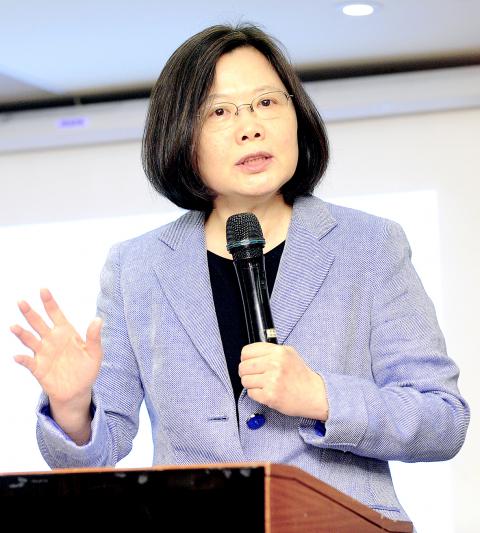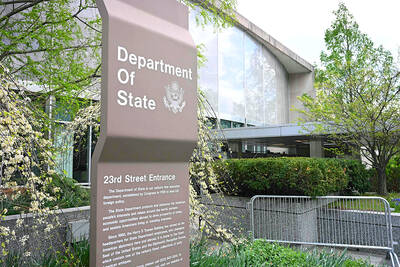Democratic Progressive Party (DPP) Chairperson Tsai Ing-wen (蔡英文) yesterday rejected a parallel drawn by President Ma Ying-jeou (馬英九) between her expectation of Taiwan as a “free island” (自由島) and the government’s free economic pilot zone policy.
Tsai made the rebuttal in a press release issued on Facebook yesterday, one day after Ma raised a question during the Chinese Nationalist Party’s (KMT) Central Standing Committee’s meeting on Wednesday about a speech Tsai gave at the Morgan Stanley Asia-Pacific Summit in Singapore in November last year.
In the speech, Tsai said Taiwan must position itself as a “free island” that boasts a liberalized economy, a diverse culture and a democratic political system, if it aspires to continue to play a key and constructive role in the Asia-Pacific region.

Photo: Chen Chih-chu, Taipei Times
“This part of the speech sounds fairly professional. People who are not aware of the identity of the speaker might even think she is some academic supportive of the government’s proposed free economic pilot zones project … since no one can really tell how [Tsai’s] goal is any different from the goal the government is endeavoring to achieve by setting up the pilot zones,” Ma said at the meeting.
The free economic pilot zone project aims to set up zones in Keelung Port, Suao Port in Yilan County, Taipei Port, Taichung Port, Anping Port in Greater Tainan, Kaohsiung Port, the Taoyuan Aerotropolis in Taoyuan County and the Pingtung Agricultural Biotechnology Park to serve as models for business convenience and liberalization.
Tsai, who has repeatedly taken issue with the project, criticizing it as an “empty policy,” yesterday said Ma had taken her words out of context.
“I clearly stated during my speech that the ‘free island’ initiative is built on three pillars: a liberalized economy, a diverse culture and a democratic political system, as there is no way Taiwan could ever maintain a strong foothold in the Asia-Pacific region if it only cares about trade liberalization,” she said.
The “free island” initiative seeks a balanced development of all the three pillars, while Ma’s oft-touted initiative of a “free economic island” only emphasizes economic development, she said.
“Our goals are on two totally different levels… Ma should have understood the main points of my speech before quoting me out of context,” Tsai said.
“He also should not have drawn a parallel between my initiative and his narrow-minded plan to try to gloss over the poor examples that have been set by the free economic pilot zone project,” Tsai added.
Meanwhile, National Taiwan University Hospital physician Ko Wen-je (柯文哲) — an independent aspirant for the Taipei mayoral election in November — was canvassing the streets around the Shuang Lian Traditional Market in Taipei’s Datong District (大同) yesterday morning.
The event was held hours before the DPP was due to conduct a public opinion poll last night on whether Ko or DPP Legislator Pasuya Yao (姚文智) would be a better pan-green camp candidate for the mayoral election.
The poll results are scheduled to be announced today.

Hong Kong singer Eason Chan’s (陳奕迅) concerts in Kaohsiung this weekend have been postponed after he was diagnosed with Covid-19 this morning, the organizer said today. Chan’s “FEAR and DREAMS” concert which was scheduled to be held in the coming three days at the Kaohsiung Arena would be rescheduled to May 29, 30 and 31, while the three shows scheduled over the next weekend, from May 23 to 25, would be held as usual, Universal Music said in a statement. Ticket holders can apply for a full refund or attend the postponed concerts with the same seating, the organizer said. Refund arrangements would

Former president Tsai Ing-wen (蔡英文) on Monday called for greater cooperation between Taiwan, Lithuania and the EU to counter threats to information security, including attacks on undersea cables and other critical infrastructure. In a speech at Vilnius University in the Lithuanian capital, Tsai highlighted recent incidents in which vital undersea cables — essential for cross-border data transmission — were severed in the Taiwan Strait and the Baltic Sea over the past year. Taiwanese authorities suspect Chinese sabotage in the incidents near Taiwan’s waters, while EU leaders have said Russia is the likely culprit behind similar breaches in the Baltic. “Taiwan and our European

Taiwanese indie band Sunset Rollercoaster and South Korean outfit Hyukoh collectively received the most nominations at this year’s Golden Melody Awards, earning a total of seven nods from the jury on Wednesday. The bands collaborated on their 2024 album AAA, which received nominations for best band, best album producer, best album design and best vocal album recording. “Young Man,” a single from the album, earned nominations for song of the year and best music video, while another track, “Antenna,” also received a best music video nomination. Late Hong Kong-American singer Khalil Fong (方大同) was named the jury award winner for his 2024 album

The US Department of State on Monday reaffirmed that US policy on Taiwan remains unchanged, following US President Donald Trump’s use of the term “unification” while commenting on recent trade talks with China. Speaking at a wide-ranging press conference, Trump described what he viewed as progress in trade negotiations with China held in Geneva, Switzerland, over the weekend. “They’ve agreed to open China — fully open China, and I think it’s going to be fantastic for China. I think it’s going to be fantastic for us,” Trump said. “I think it’s going to be great for unification and peace.” Trump’s use of the